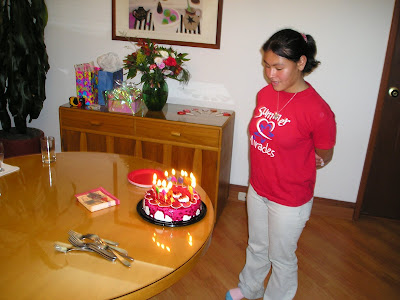The Perfect Family -- More thoughts from Jane
Of course, there is no such thing as a perfect family! Or, to put it another way, perhaps ANY family is the perfect family for a child who has none. We know single moms who have adopted, a single dad who has two adopted siblings, and families whose adopted teens are "only children" in their new family group. However, after three years of socializing with these parents, hearing their stories and observing outcomes, John and I are in agreement about one thing: older parents who have already raised their children make pretty good adoptive parents of an older child. So my observations are those of an older mom whose biological children have flown the nest.
Our older adoptive child exhibited two kinds of behavior: the universal adolescent and the "red flag". Being able to recognize the difference between the two and responding appropriately was HUGE in building our relationship with our adopted 14 year old.
We had raised two biological children and sent them off into the world. We had been through the teen years and survived them, learning a lot along the way. Parents of children who have flown the nest will be more than familiar with the teen statements: "I didn't ask to be born" or "I wish I was anywhere but here". Or how about, "I can't wait to leave." All part of growing up.
When our Colombian daughter had her "meltdown" (the crisis that will happen after the initial "honeymoon" period is over), we weren't shocked to hear: "I want to go back. I don't want to stay here any more." It was rough, but it didn't hurt our feelings: we kind of knew that was coming eventually.
The adopted infant or toddler won't present his new parents with these announcements. But the adoptive parents of a preteen or teen need to be ready for this unique challenge. Personally, we used it as an opportunity to reassure our daughter that we loved her and that she - and we - had no choice but to figure it out. She wasn't going to be returned to Colombia --EVER! In good times and bad, she was now part of our family -- forever.
"I don't want to be here" was an opportunity to say, "You have no choice. You are a part of this family and you can't leave." It was also a challenge from her to us: would we reject her and send her back because she isn't perfect? What would happen if she said she wanted to leave?
Respect the pain, but make it clear that no matter what the child does or says, he is part of the family group now and solutions to problems need to be found together.
Most of these older children haven't had to learn how to be a part of a family. There hasn't been significant emotional attachment to anyone. Our daughter told us that girls in the orphanage wanted to be adopted because "THERE WEREN'T ANY RULES IN A FAMILY", unlike in the orphanage where rules were strict! What a shock for her to find out that families have rules and that it's harder to skirt them when you're the only kid in the house!
So realistically, your new older child will need as much nurturing as an infant. In fact, she might revert to childish behavior such as baby talk. When this happened, we knew that our daughter was under stress and that she needed extra TLC. It happened less and less, the longer she was here with us.
Every child is different and there are all kinds of signs of stress. During one visit of older orphans in our city, a potential mom (who had no biological children) and I were watching one of the visiting kids interact with his host family. He was giving away the presents he had received. The host mom's comment was, "Oh , isn't he just the most generous boy!" My thought, having raised two kids already, was that this was a red flag behavior: the child thought that he needed to buy love and attention. My biological kids would never have thought of giving away presents they had just received: having that comparison is really helpful.
We also learned not to bring up our child's past, but to be open to discussing it in a matter of fact way when the topic did come up. Couching responses carefully and in a nonjudgmental way was a challenge. Helping your child to forgive, but not forget, is part of your job.
Lastly, one more observation. When our child was finally awarded to us, she said she wanted to change her birth surname, which we insisted she keep as her middle name. We told her that, even though her life was about to change, she didn't need to change her identity: that it was important for her to keep her Colombian last name and to be proud of it. You can change the name, but that doesn't make the past go away. So our daughter kept her last name as her middle name. However, she has recently asked if she can take my first name as her second middle name. Of course, I said yes: it's a pretty good feeling.
Learn More about Jane's efforts to help other older Colombian orphans at:
http://www.friendsofcolombianorphans.org/#site/mission

Comments
Someday, I would love to adopt older children. (We have adopted two as infants from Colombia, and are in the process of adopting another infant, this time from Taiwan.) And I totally agree, the best parents of an older child are experienced ones. :) Thank you for sharing your story.